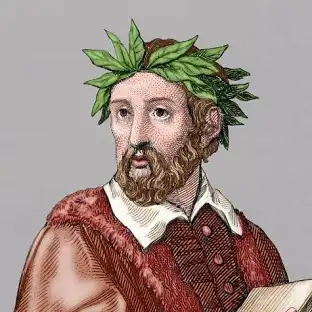
Torquato Tasso (1544–1595) was an Italian poet whose works, especially his epic Jerusalem Delivered (La Gerusalemme Liberata), became central to the development of European Renaissance literature. Known for his lyrical and dramatic works, Tasso’s contributions span across both classical and Christian themes. His turbulent life, filled with personal struggles, political conflict, and profound creativity, has cemented his legacy in the canon of Italian and world literature.
Torquato Tasso Biography
Torquato Tasso was born on March 11, 1544, in Sorrento, Italy, into an aristocratic family with ties to the royal court. His father, Bernardo Tasso, was a poet and courtier, while his mother, Portia de’ Rossi, came from a noble family. Growing up in a cultured environment, Tasso was exposed to literature and classical learning from an early age. His early education was steeped in Latin and Greek, with a particular focus on the works of Homer, Virgil, and Ovid.
In 1556, Tasso entered the University of Padua to study law but quickly shifted his focus to philosophy and literature. His academic prowess and refined poetic style earned him a reputation, and by the early 1560s, he was already gaining attention for his compositions. Tasso’s first major literary work, Rinaldo, was written in 1562. However, it was the epic poem Jerusalem Delivered (La Gerusalemme Liberata), completed in 1580 and first published in 1581, that established him as one of Italy’s greatest poets. This monumental work, inspired by the First Crusade, combines chivalric and religious themes and has been lauded for its emotional depth and rhetorical power.
Despite his literary success, Tasso’s life was marred by personal and political turmoil. He had a fraught relationship with his patrons, including the Duke of Ferrara, and he was often at odds with the prevailing courtly circles. His mental health also deteriorated, leading to several periods of confinement. In 1579, after a heated dispute with the Duke, Tasso was imprisoned for a time in a psychiatric institution, an event that greatly affected his later works. His experiences with mental instability are often reflected in his poetry, which oscillates between moments of sublime beauty and deep personal conflict.
Tasso’s literary contributions were not confined to Jerusalem Delivered. His later work, Gerusalemme Conquistata, is a darker sequel to his first epic, focusing on the fall of Jerusalem. Although it was never as popular as his earlier work, it reveals Tasso’s ongoing engagement with Christian themes and the dramatic forces of fate and divine will.
Tasso spent the last years of his life moving between various cities, enduring financial hardship and ill health. He passed away in Rome on April 25, 1595, at the age of 51. Despite the challenges he faced during his lifetime, Torquato Tasso’s legacy as a master of poetic form and an icon of the Renaissance endures, with his works continuing to influence poets and scholars today.
Torquato Tasso Poems
Torquato Tasso Quotes
1. “The path to glory is strewn with thorns.”
2. “Love is a storm that leaves no heart unscathed.”
3. “He who seeks glory should not fear pain.”
4. “The courage of the heart is a mirror to the soul.”
5.”We are the captives of our own desires.”
6. “Time is an endless river; we are but fleeting shadows upon itssurface.”
7. “What is written in the stars is beyond our control.”
8. “A knight without honor is like a rose without fragrance.”
9. “True love is a fire that consumes both body and soul.”
10. “Faith is the light that guides us through the darkest nights.”
Torquato Tasso Facts
1. Tasso was born in Sorrento, Italy, in 1544.
2. His father, Bernardo Tasso, was a well-known poet andcourtier.
3. Tasso studied law at the University of Padua before turining to literature.
4. His most famous work, Jerusalem Delivered, was completed in 1580 and is an epic based on the First Crusade.
5. Tasso spent time in a psychiatric institution due to his deterioprating mental health, which influenced much of his later poetry.
6. His epic poem Gerusalemme Conquistata is a darker seequel to Jerusalem Delivered.
7. Tasso wrote the pastoral play Aminta, which was highly influential in Renaissance drama.
8. He had a strained relationship with his patron, the Duke of Feerrara, leading to Tasso’s imprisonment.
9. Tasso’s works were frequently criticized during his lifetime, and he often expressed frustration with his critics.
10. He died in 1595 in Rome, leaving behind a legacy as cone of Italy’s most important Renaissance poets.
